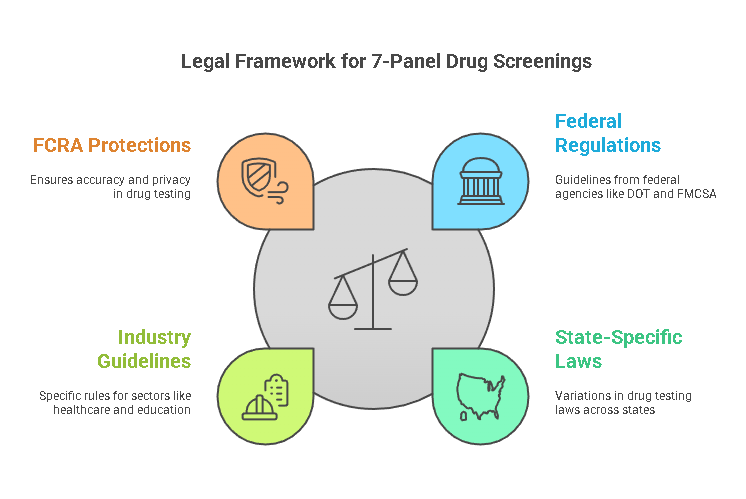7-Panel Drug Screening: A Detailed Overview for Employers and Employees
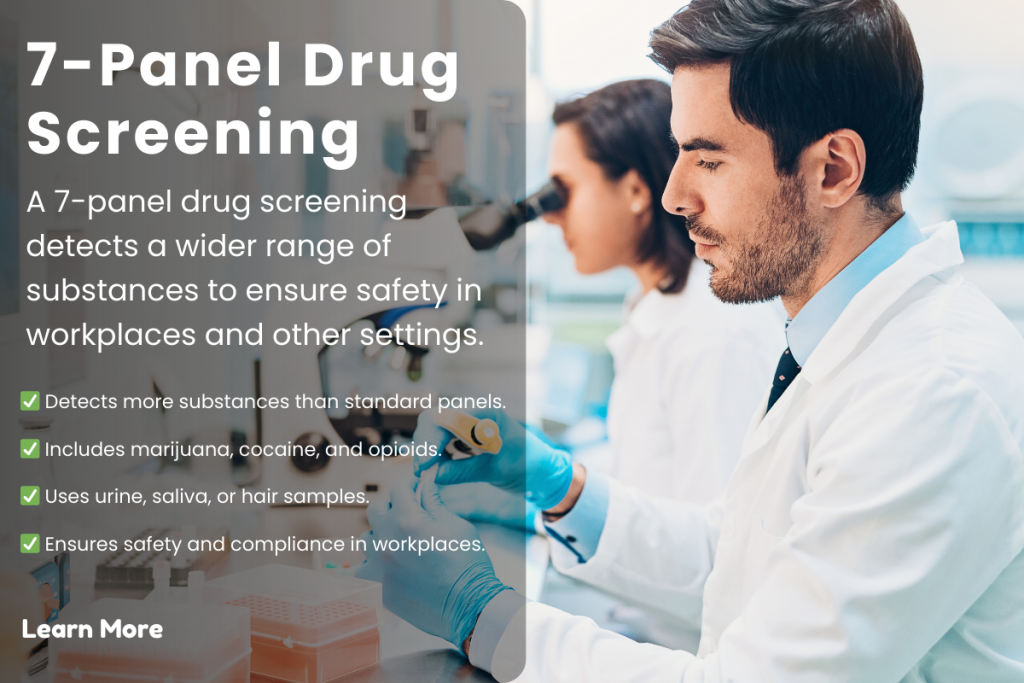
Introduction To 7-Panel Drug Screening
A 7-panel drug screening is a vital tool in maintaining safety, productivity, and compliance in various industries. Unlike other forms of drug testing, it offers a comprehensive analysis of an individual’s recent drug use, covering seven specific categories of substances. This makes it an essential practice for employers, healthcare facilities, schools, and other organizations that prioritize a safe and drug-free environment.
In this article, we’ll delve into the essential aspects of 7-panel drug screenings, exploring their purpose, methodology, and significance. We will also discuss the substances typically tested, their relevance, and the industries where these screenings are most applicable.
What Is A 7-Panel Drug Screening?
A 7-panel drug screening is a diagnostic test designed to detect the presence of seven different drug categories in a person’s system. It is frequently used by employers, legal systems, and medical facilities to monitor compliance, ensure safety, and address substance abuse concerns.
Key Characteristics Of A 7-Panel Drug Screening:
- Comprehensive Testing: Targets a broader range of substances compared to basic panels like 5-panel tests.
- Versatility In Application: Used in pre-employment screening, routine workplace checks, and healthcare monitoring.
- Enhanced Accuracy: Reduces the chances of misidentifying drug use by testing multiple categories.
Substances Tested In A 7-Panel Drug Screening
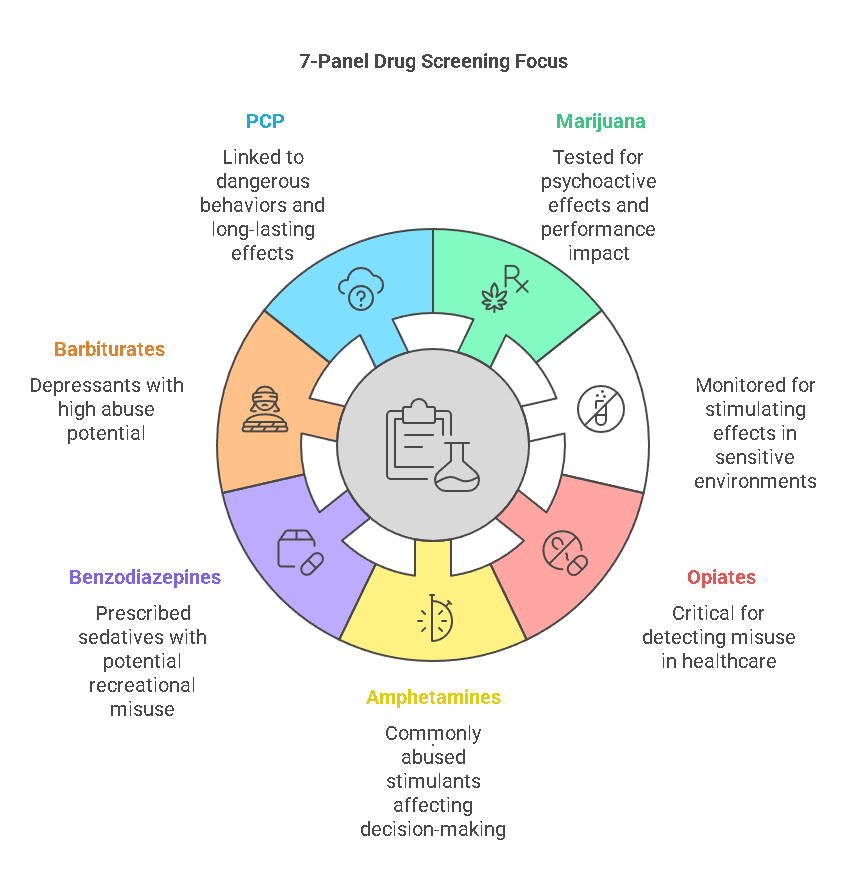
The substances screened in a 7-panel drug test include:
- Marijuana (THC): Monitored due to its psychoactive effects and potential impact on performance.
- Cocaine: Known for its stimulating effects, often tested in high-sensitivity environments.
- Opiates (e.g., heroin, codeine): Critical for detecting misuse in industries like healthcare.
- Amphetamines: Commonly abused stimulants that can impair decision-making.
- Benzodiazepines: Prescribed sedatives that may be misused for recreational purposes.
- Barbiturates: Depressants with high abuse potential, especially among specific demographics.
- Phencyclidine (PCP): A dissociative drug linked to dangerous behaviors and long-lasting effects.
These substances were chosen for their prevalence in misuse, particularly in safety-sensitive industries like transportation, healthcare, and manufacturing.
How A 7-Panel Drug Screening Works
Conducting a 7-panel drug screening involves collecting a biological sample from the individual and analyzing it for traces of the specified substances.
Step-By-Step Process:
- Sample Collection:
- Common sample types include urine, saliva, or hair. Urine tests are the most prevalent due to their affordability and ease of collection.
- The sample is collected in a controlled environment to prevent tampering.
- Initial Screening:
- A preliminary immunoassay test identifies the presence of any substances.
- If positive, the sample undergoes further analysis.
- Confirmation Testing:
- A gas chromatography-mass spectrometry (GC-MS) test or a high-performance liquid chromatography (HPLC) test confirms initial findings.
- This step eliminates false positives caused by cross-reactivity with other medications.
- Result Reporting:
- Results are reported as either positive, negative, or inconclusive.
- Employers or relevant authorities receive a comprehensive report outlining the findings.
The accuracy and reliability of the process depend significantly on the testing facility’s protocols and the quality of the sample collected.
Importance Of 7-Panel Drug Screenings
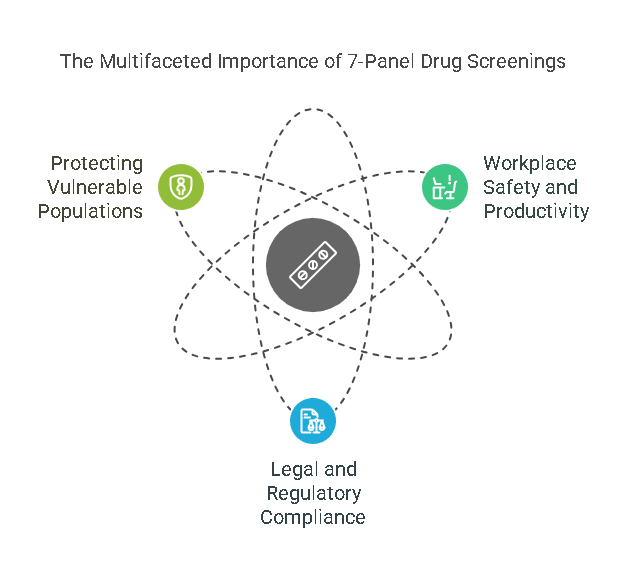
The significance of 7-panel drug screenings lies in their ability to identify substance misuse and promote safer environments.
Workplace Safety And Productivity:
- Drug screenings reduce workplace accidents by identifying employees under the influence.
- They contribute to a culture of accountability, enhancing overall productivity.
Legal And Regulatory Compliance:
- Industries regulated by federal laws, such as the Department of Transportation (DOT), mandate drug testing to ensure compliance.
- Organizations can avoid lawsuits and penalties by adhering to these requirements.
Protecting Vulnerable Populations:
- In healthcare, education, and childcare, screenings ensure that individuals in positions of trust are not impaired by substance use.
- They also help safeguard patients, students, and children from harm.
Who Needs 7-Panel Drug Screenings?
Industries And Professions:
- Transportation: Drivers and operators are routinely tested to prevent accidents caused by impairment.
- Healthcare: Medical professionals are screened to maintain patient safety and trust.
- Education And Childcare: Teachers, counselors, and daycare staff must be drug-free to ensure the welfare of minors.
- Manufacturing And Construction: Workers in high-risk environments undergo testing to prevent workplace injuries.
- Law Enforcement And Security: Officers and security personnel are tested to uphold ethical standards and public safety.
Scenarios Requiring 7-Panel Testing:
- Pre-Employment Checks: Ensures candidates meet organizational standards.
- Random Testing: Deters employees from engaging in substance use.
- Post-Incident Testing: Determines if substance use contributed to workplace accidents.
- Rehabilitation Monitoring: Tracks the progress of individuals in substance abuse recovery programs.
By addressing substance use proactively, 7-panel drug screenings contribute to safer, more productive environments across diverse sectors.
Challenges And Limitations
While 7-panel drug screenings are highly effective, they are not without challenges:
- False Positives And Negatives:
- Certain medications or foods may interfere with test results, leading to inaccuracies.
- Privacy Concerns:
- Employees may feel their personal boundaries are being encroached upon.
- Organizations must handle results with confidentiality and professionalism.
- Testing Costs:
- Comprehensive panels are more expensive than basic tests, which may deter smaller organizations.
- Detection Windows:
- Different substances remain detectable for varying periods, potentially missing recent or past usage.
Despite these challenges, implementing robust procedures and partnering with reputable testing providers ensures reliable outcomes.
The foundational knowledge of 7-panel drug screenings sets the stage for exploring their broader benefits, implementation strategies, and the role of specialized providers like PreciseHire.
Conducting 7-Panel Drug Screenings and Their Benefits
7-panel drug screenings are an essential part of ensuring a safe and compliant work environment. From identifying potential drug abuse to maintaining productivity and safety, these screenings offer substantial benefits for various industries. In this section, we will explore the detailed process of conducting a 7-panel drug screening, the benefits it provides, and the challenges associated with it. We will also examine how PreciseHire can assist businesses in implementing an effective drug screening program, along with a comparison to other types of drug screenings.
How to Conduct a 7-Panel Drug Screening
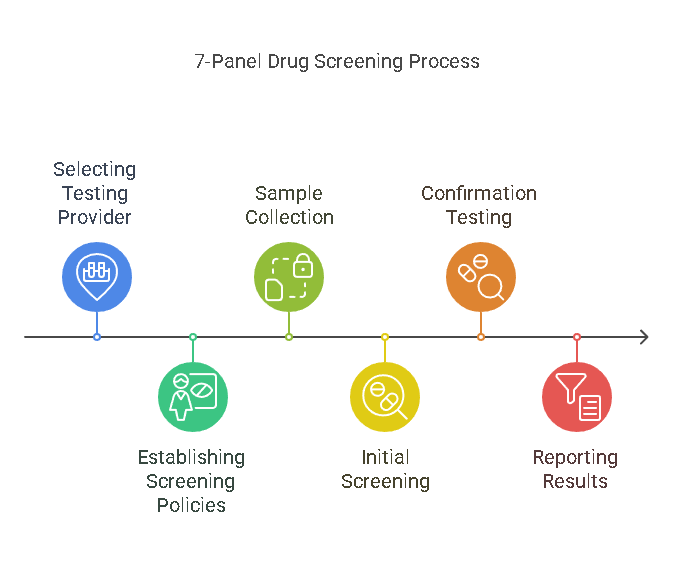
Successfully conducting a 7-panel drug screening requires planning, the right tools, and the correct process to ensure accuracy and reliability. Organizations that conduct such screenings need to follow several key steps to ensure compliance with legal standards and to protect the integrity of the process.
Step-by-Step Guide to Conducting 7-Panel Drug Screenings:
- Selecting a Testing Provider:
- Organizations should partner with certified drug testing laboratories that are accredited by the Substance Abuse and Mental Health Services Administration (SAMHSA) or meet local state regulations.
- Providers must offer various testing options such as urine, hair, and saliva, as well as provide secure and confidential handling of all samples.
- Establishing Screening Policies:
- Employers need clear and detailed policies on when and how drug screenings will take place, such as for pre-employment, random, or post-incident testing.
- These policies must comply with both federal and state regulations (e.g., Department of Transportation regulations for safety-sensitive industries).
- Sample Collection:
- Collection must occur in a secure, private setting to ensure the integrity of the sample and avoid tampering.
- Urine testing is the most common method for 7-panel drug screenings, as it provides a reliable detection window and is cost-effective. Other sample types like hair or saliva may also be used depending on the specific needs.
- Initial Screening:
- The collected sample undergoes an initial immunoassay (IA) screening test. This preliminary test detects the presence of drugs in the sample and can provide quick results.
- If the test is positive, the sample is sent for confirmation testing to ensure accuracy.
- Confirmation Testing:
- A confirmation test, usually conducted with gas chromatography-mass spectrometry (GC-MS), is used to definitively identify the presence of drugs. This step reduces the likelihood of false positives and ensures that any identified drugs are present in sufficient concentrations.
- Reporting Results:
- Once the testing is complete, the laboratory sends the results to the employer or organization, usually in a confidential report format.
- If the results are negative, the individual is cleared, but if they are positive, further action may be required depending on the organization’s policies (e.g., retesting, rehabilitation programs, or disciplinary measures).
Benefits of 7-Panel Drug Screenings
7-panel drug screenings offer several significant benefits to organizations, ensuring both safety and compliance. Let’s examine the key advantages:
- Workplace Safety and Productivity:
- Reduced Accidents and Injuries: By testing employees regularly, employers can prevent accidents caused by impaired workers. Studies show that drug use can impair judgment and coordination, making it critical to ensure a drug-free workforce, especially in safety-sensitive jobs like construction or transportation.
- Enhanced Employee Performance: Employees who are free from substance abuse are more likely to be focused, productive, and efficient in their roles. Drug testing discourages drug misuse, fostering a positive work culture.
- Legal and Regulatory Compliance:
- Federal and State Regulations: Many industries are required by law to conduct drug screenings, especially in transportation, healthcare, and other safety-sensitive fields. For instance, the Department of Transportation (DOT) mandates drug testing for drivers and other transport-related professionals.
- Prevention of Liability: By implementing drug testing policies, companies can avoid legal challenges related to negligent hiring or wrongful termination claims. It also helps companies demonstrate they are fulfilling their duty of care to employees.
- Cost-Effectiveness:
- While 7-panel drug screenings may have a higher initial cost than standard screenings, they can ultimately save employers money by reducing workplace injuries, improving retention, and boosting overall productivity. Long-term savings outweigh the upfront investment.
- Maintaining a Drug-Free Environment:
- Drug testing fosters a drug-free workplace, which is particularly crucial in organizations where impaired decision-making could have catastrophic consequences (e.g., healthcare, aviation, construction).
- It also helps organizations comply with the Drug-Free Workplace Act, which requires federal contractors and grant recipients to maintain a drug-free workplace.
Common Challenges and Misconceptions
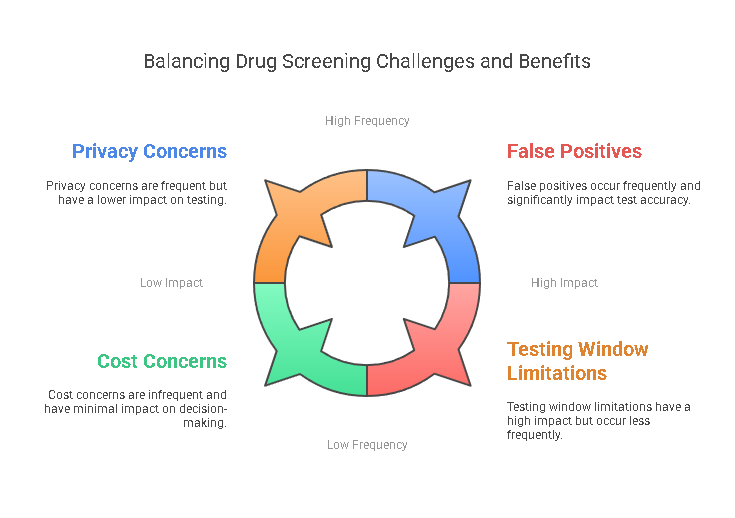
While 7-panel drug screenings provide many benefits, several challenges and misconceptions exist that organizations need to address.
- False Positives and False Negatives:
- One of the most common concerns with drug testing is the possibility of false positives (incorrectly identifying drug use) or false negatives (missing actual drug use). This can happen due to cross-reactivity between substances or errors in sample collection. However, confirmation tests (e.g., GC-MS) significantly reduce the risk of such issues.
- Certain medications or foods, such as poppy seeds or prescription drugs, may lead to false positives, which is why it is important to have proper protocols in place to confirm results.
- Privacy Concerns:
- Employees may feel that their privacy is being violated through drug testing. It’s essential for employers to create transparent, clear drug testing policies that respect employee privacy while maintaining legal compliance. Results must be kept confidential and shared only with appropriate personnel.
- Ensuring proper consent is obtained from individuals before conducting drug testing is key to addressing privacy concerns.
- Cost Concerns:
- Comprehensive 7-panel drug screenings can be more expensive than basic drug tests, which may deter small businesses or organizations with limited budgets. However, when considering the long-term benefits, such as reduced workplace accidents, improved employee well-being, and regulatory compliance, the investment pays off.
- Testing Window Limitations:
- Detection windows for different substances vary, and some drugs remain detectable for extended periods while others may clear the body more quickly. This limitation can sometimes lead to a missed opportunity to identify substance misuse. It’s important to educate employers and employees about the limitations of drug screenings and the benefits of regular testing.
Comparison with Other Drug Screening Panels
When selecting a drug testing program, employers may also be considering other panels, such as 5-panel or 10-panel drug tests. Here’s a comparison of the 7-panel drug screening with other common drug tests:
| Panel Type | Substances Tested | Cost | Ideal For |
|---|---|---|---|
| 5-Panel | Marijuana, Cocaine, Opiates, Amphetamines, PCP | Lower cost | Basic screenings, lower-risk industries |
| 7-Panel | Marijuana, Cocaine, Opiates, Amphetamines, Benzodiazepines, Barbiturates, PCP | Moderate cost | High-risk industries, transportation, healthcare |
| 10-Panel | Marijuana, Cocaine, Opiates, Amphetamines, Benzodiazepines, Barbiturates, PCP, Ecstasy, Methadone, Propoxyphene | Higher cost | Comprehensive screenings for high-risk jobs |
The 7-panel drug test is a middle ground, providing a comprehensive analysis without the higher cost and complexity of a 10-panel test. It strikes a balance between accuracy and affordability for many organizations.
Precisehire’s Role in Drug Screening
Precisehire plays a vital role in assisting organizations with effective drug screening programs. With a focus on accuracy, efficiency, and legal compliance, Precisehire provides tailored drug testing solutions for companies of all sizes.
Key services provided by Precisehire include:
- Customized Drug Screening Plans: Based on the organization’s specific needs, industry, and compliance requirements.
- Compliance Assistance: Ensuring that all drug screening practices align with federal, state, and local regulations.
- Fast and Accurate Results: Access to reliable and timely test results with clear reporting to help with decision-making.
- Confidential and Secure Testing: Maintaining privacy for all candidates and employees during the drug testing process.
By partnering with Precisehire, companies can mitigate risks associated with drug use in the workplace while also ensuring they adhere to regulatory standards.
Legal Considerations for 7-Panel Drug Screenings
